Whether you’re sitting down, standing up, or lying down, you’ve probably mindlessly scrolled through your social media feeds. Although seemingly a harmless habit—especially if you have a few minutes to spare—there may be health risks associated with social media use. The American Academy of Pediatrics has acknowledged the potential negative effects of social media in children and adolescents, such as cyberbullying, “Facebook depression,” sexting, and even exposure to inappropriate content. Yet, these risks may be applicable to adults too.
Learn about the 10 ways unhealthy social media use may negatively affect the brain.
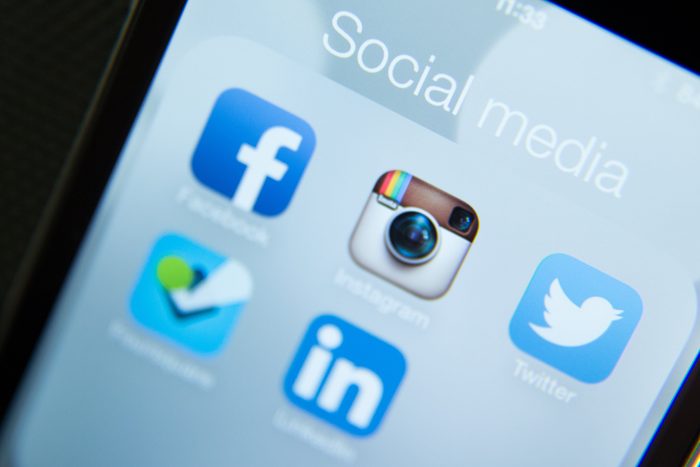
It may make you spend more money
Watch your wallet the next time you’re scrolling through your social media feeds—or, rather, put it under lock and key. According to Schwab’s 2019 Modern Wealthy survey, 49 percent of millennials reported that social media influenced them to overspend on experiences. And science backs up this spending phenomenon: A 2013 study published in the Journal of Consumer Research linked heavy social media use among people with “strong ties” to close friends to higher levels of credit card debt, as well as a higher body mass index. Learn what can happen when you quit social media altogether.

It may alter your appetite
You may want to limit your time scrolling through images of “food porn,” because it could lead to overeating. According to a 2015 review published in Brain and Cognition, looking at amazing images of mouthwatering food can cause your brain to undergo physiological and neurophysical changes, making you feel hungry, even when you’re not actually hungry. In the review, the researchers cited a study that found people who were obese were more likely to respond to these “external food cues” even when full. Posting a photo of your cheese fries might not seem all that terrible, but these are the photos you should never post to any social media account.
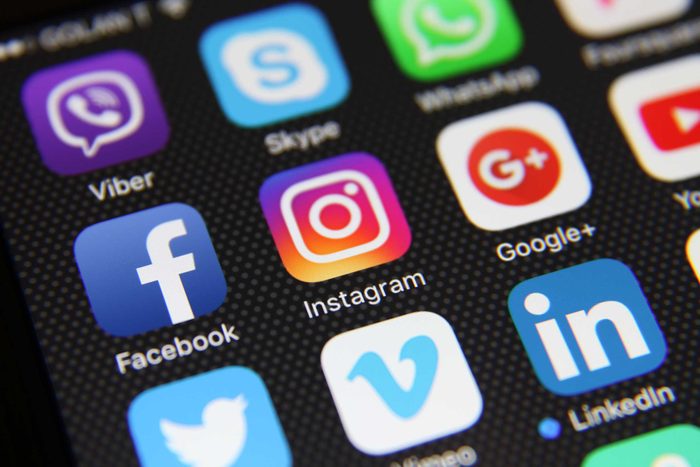
It may interfere with your ability to think independently
Peer pressure is alive and well on social media, with adults as well as with teens, and what’s interesting is that you may not even realize it’s happening. “Social media encourages groups of people connected to each other online to share similar ideas and beliefs,” says Alex Anastasiou, DO, a San Francisco–based psychiatrist. “Basic human psychology suggests that people have a tendency to conform to their ‘group’ so that they can fit in and be well-liked. Over time, the values and beliefs shared by a group become more similar.” You can likely see this phenomenon at work in political posts or even in parent groups. He adds that this “groupthink” not only quashes original thought, but can even be dangerous in some cases when the desire for conformity results in exaggerated or irrational decision-making. (Don’t miss what psychologists need you to know about doomscrolling.)
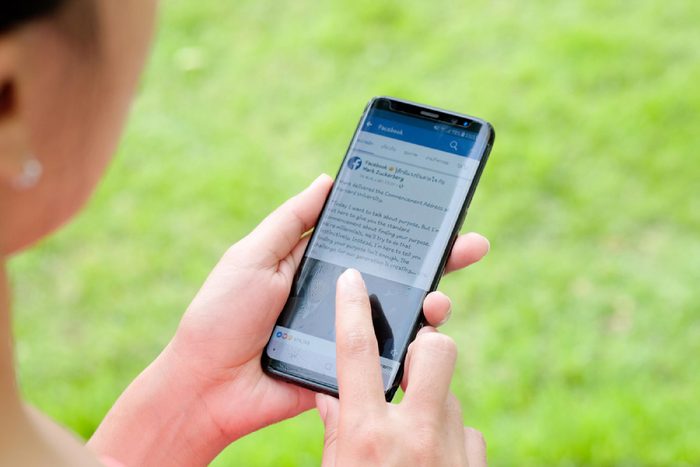
It may hurt your self-esteem
Do you covet what your Facebook friends have? Many people do, and these comparisons can negatively impact their self-esteem. One Canadian study of 188 female undergraduate students, published in the journal Body Image in 2019, found that the women felt worse about their own appearance after interacting with someone they felt was more attractive. And the negative comparisons don’t stop at body image…though they can stop (or at least decrease) if you reduce the time you spend on social media.
According to another study highlighted in the Journal of Social and Clinical Psychology in 2018, people who decreased their regular use of social media, limiting it to 30 minutes a day (10 minutes each on Facebook, Snapchat, and Instagram), reported reduced levels of depression and loneliness and felt better after three weeks.
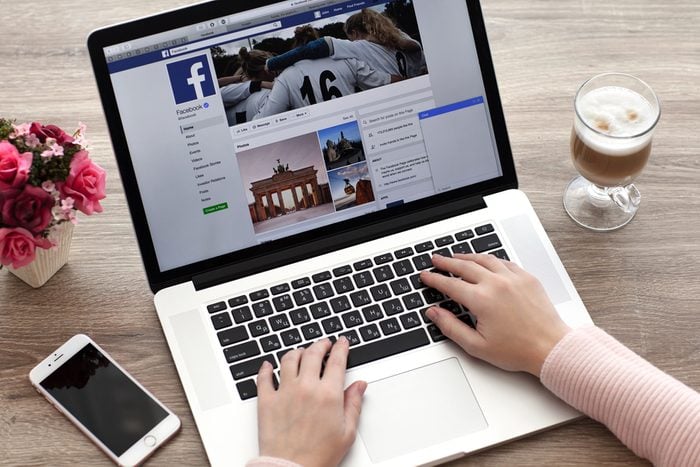
It may “butcher” real-life conversations
We can spend so much time talking to people over social media—with “LOLs,” likes, emojis, and quick comments—that we may have a more difficult time engaging in conversation with people in real life. “People are spending less time meeting up in person and learning how to express both positive and negative emotions in a healthy way,” says Dr. Anastasiou. “Instead, people are learning to depend on their emoji to express what they are feeling or thinking.” In-person conversations can be messier and less linear, for sure, but they can also ultimately be more meaningful and bonding. These are the hidden downsides of social media you probably didn’t know.
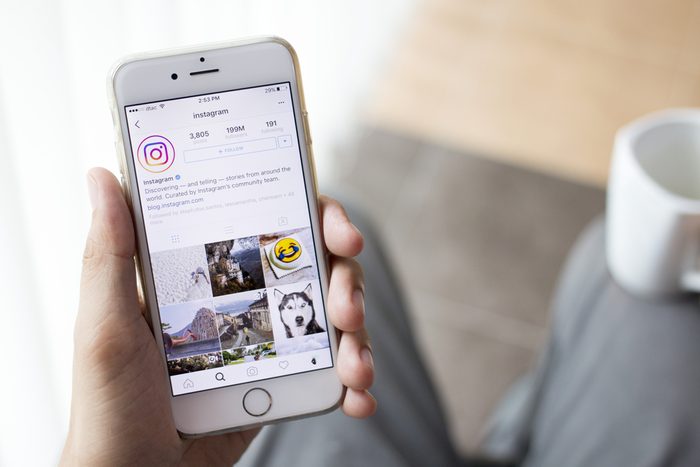
It may activate your reward center
Actively using social media may lead to a widespread reaction across the brain’s reward center. In a study of 32 teens, published in the journal Psychological Science in 2016, researchers found that the same parts of the brain that are activated when people eat chocolate or win money were activated when the teens saw a bunch of likes on a photo—their own or their friends’ photos. This type of peer influence and its “conformity effect” isn’t limited to adults, says Dr. Anastasiou. “When we receive online ‘likes,’ the reward center of the brain, called the nucleus accumbens, lights up. With excessive use, this type of interaction can train the brain to release rewarding chemicals such as dopamine much the same way that addiction works with things like drugs, shopping, and gambling,” he says. “This is worrisome because the more that someone uses social media, [the more] they come to expect and require this type of effect in order to feel happy.”
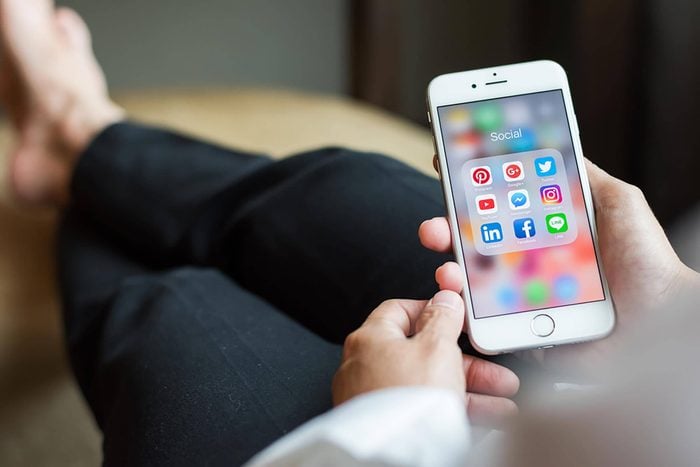
It may be linked to your brain’s grey matter
In a 2018 study published in the journal Social Neuroscience, researchers noted there is a correlation between online social network size and human brain structure. Researchers used magnetic resonance imaging to study the brains of 33 Facebook users and found that people who spent more time on Facebook tended to have greater grey-matter volumes in the regions of the brain connected to social-semantic tasks, such as recognizing social-group members and attempting to understand their states and motivations. While this isn’t necessarily a bad thing, it is a surprising side effect—although the study couldn’t determine which came first.
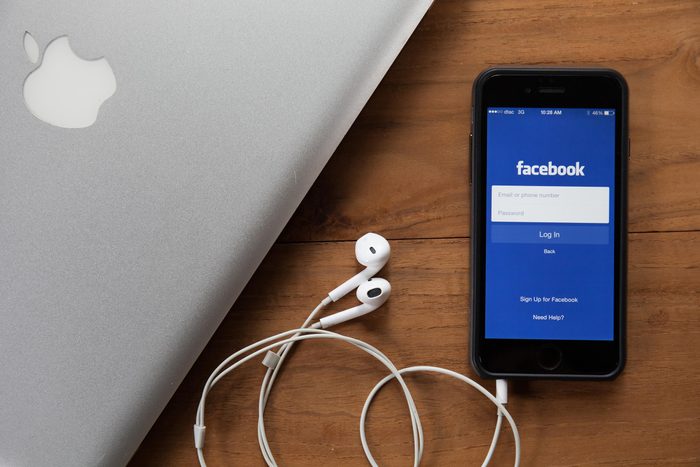
It may make you worse at multitasking
Constantly checking your e-mail on your smartphone, switching over to Instagram to scroll for a bit, and then opening Snapchat to share what you’re doing may lead you to think you’re a good multitasker. In reality, managing multiple accounts and switching your attention so often and quickly worsens your ability to focus on multiple activities. A 2018 review published in the Proceedings of the National Academy of Sciences, people who multitasked heavily on social media didn’t perform as well as lighter media multitaskers in a variety of cognitive domains. While the researchers caution that more studies are needed, the biggest issues seem to be with tasks that call for sustained goal-oriented attention. Dr. Anastasiou, who not part of this study, recommends disabling push notifications to reduce the temptation to keep checking all of your social media accounts.

It may make you lose sleep
Melatonin is the hormone in your body that regulates sleep. High levels of melatonin can help you sleep while low levels can keep you awake. While any kind of light can reduce how much melatonin your body makes, blue light—which is emitted from the screen of your smartphone—lessens your melatonin levels even more. Social media scrolling, especially at night, can disrupt your circadian rhythms. That said, not all types of social media use causes problems. Here are some social media habits that you shouldn’t feel bad about.

It may spark phantom vibrations
Each time your phone vibrates with a push notification, that reward center in your brain is activated, again and again and again. A 2012 study in the journal Computers in Human Behavior looked at the prevalence of phantom vibrations (fake vibrations) from electronic devices in undergraduate students. Those who had a more dependent reaction to receiving messages were more likely to believe their phone was buzzing again when it actually wasn’t. Not a big deal? It might be. In a small 2016 study published in Computational Intelligence and Neuroscience, of 14 participants, found that push notifications caused people to perform more poorly on tasks and had negative effects on both cognitive function and concentration. Don’t miss these ways to have a healthier relationship with social media.